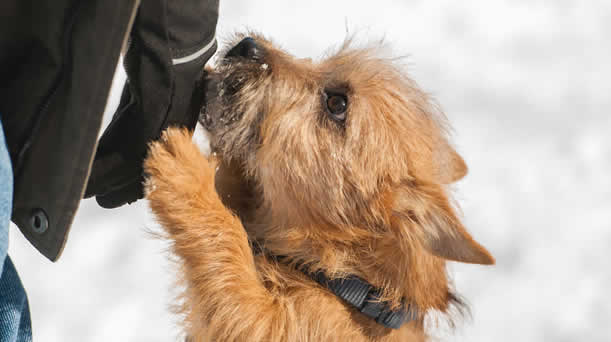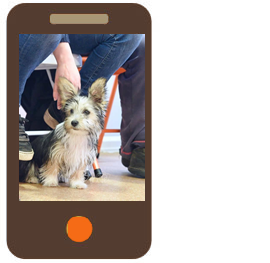Dog winter survival guide
-
- When the thermometer dips don’t leave your dog outside unattended – most pet dogs spend a lot of time inside and aren’t used to the extreme cold so could develop hypothermia or frostbite.

-
- Short-coated breeds, like greyhounds, Dobermans and Chihuahuas really struggle to cope with the cold so make sure they’ve got a cosy dog jumper or coat on when they go outside.
-
- If your dog starts lifting up their paws, whining or stopping while out on walks it could well be because their feet are too cold, so it’s a good idea to invest in some boots for them to wear.
-
- Trim the hair around your dog’s feet to help prevent ice-balls – these form between the pads and toes of the feet and are really painful.
-
- If you walk on salted pavements wash your dog’s paws after a walk because salt and grit can really irritate their footpads.
-
- Stay away from frozen ponds or lakes and keep your dog on a lead near frozen water. If they do run on to it, it’s tempting to go after them but it’s really important that you don’t. Most dogs are strong swimmers and are more likely to get themselves out of trouble than you are.
-
- Don’t be a fair-weather friend – take your dog out in all weathers where possible but be careful in slippery conditions. If you’re elderly, don’t put yourself at risk, keep your dog at home and spend time playing games indoors to stop them from getting too bored or frustrated.
-
- If your dog is less active during the winter months, don’t forget to cut back a bit on what you feed them.
- When you’re out walking wear bright/reflective clothing so you can be seen by motorists during the dark evenings. You can also get some great reflective gear for dogs too.
Cat winter survival guide
-
- Most cats prefer to snuggle up inside during the winter but if yours is the outdoors type make sure they always have a warm place they can go to at all times. And, if it’s really cold, keep them inside even if they are unimpressed – pet cats aren’t used to the extreme cold and can develop hypothermia and frostbite.
-
- Cats left outdoors often crawl into a warm car engine to get warm and, when the engine is started up, they can be seriously injured or even killed. They might also venture somewhere they shouldn’t and get trapped without food or water. If in doubt, keep your cat inside.
-
- Cats that usually go to the toilet outside may need a litter tray inside, especially when there’s snow on the ground. Also, when snow is deep cat flaps can become blocked so you’ll need to check them to make sure that your cat can get out and, more importantly, back in again.
- Make sure your cat is fitted with a microchip so if they do wander off in search of a warm place they can be traced back to you.
Rabbit and guinea pig winter survival guide
-
- Hutches should be positioned so that wind, rain, snow or sleet can’t blow in. If the weather’s particularly bad, move the hutch into an unused garage or shed if it’s possible. For guinea pigs, it’s better to keep them inside in winter, in a conservatory or unused garage.
-
- If your pets need to stay outside, help keep them snug as a bug in their hutch by covering the front with an old blanket or sacking and adding extra bedding. Don’t forget you need to change their bedding regularly.
-
- Check their water bottle regularly because the little ball freezes easily. Press the ball every few hours to keep it moving – you can get specially made bottle covers but you’ll still need to do regular checks.
-
- Your pet still needs to have access to their run during the day so they can get their regular exercise.
-
- Cold pets need more calories to keep warm so give them lots of good quality hay to nibble on.
- During the winter foxes and badgers get even hungrier, which makes them bolder than usual. Make sure your hutch is sturdy enough to survive the attention of a determined predator.

Practice Opening Times
Monday to Friday: 8.30am to 7pm
Saturday: 9am to 2pm
OUT OF HOURS
Please contact Vets Now Eastbourne at 01323 301292

